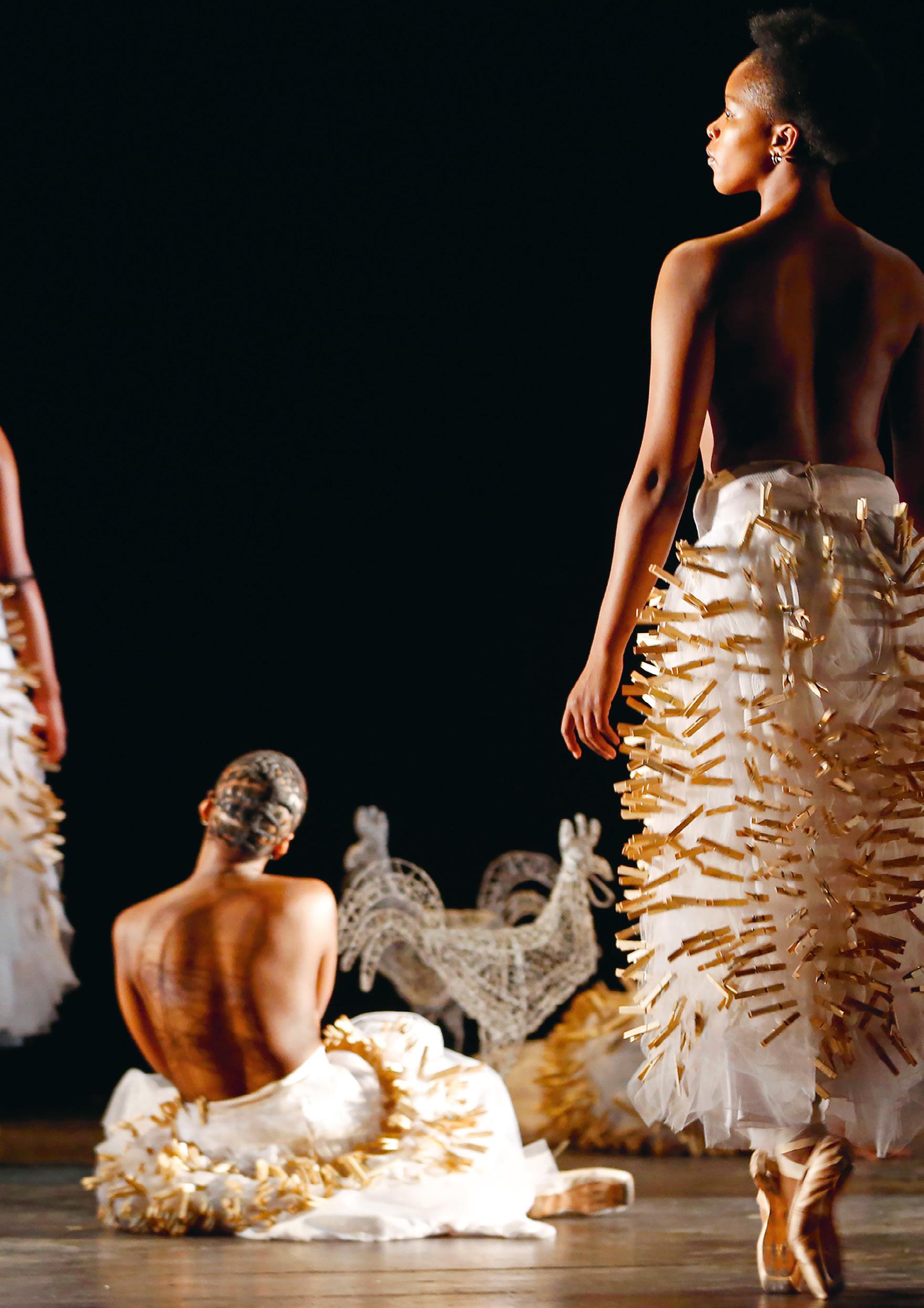

The clatter of clothes pegs disrupts the sanctity of the ballet. Powerful colour symbolism and uncompromising demystification turns the juxtaposition of European and African vocabulary of music and movement into mutual empowerment. Already in 2007, Mamela Nyamza reflected on her life as a mother, lesbian and artist in her highly praised autobiographical solo Hatched. Together with ten ballet dancers, one singer and a musician, she is now pushing her confrontation of identity and belonging, gender binarism, tradition and artistic expression further in Hatched Ensemble. Loosely inspired by Allan Kaprow (‘The line between art and life should be kept as fluid and perhaps as indistinct as possible’), the South African choreographer and activist is calling on the audience to fracture ascriptions and consider their own states of belonging.



9 June, 7 pm, 10 June, 8 pm
Volkstheater
60 mins.
Q&A
10 June, following the performance
Please note Age recommendation 13+
Concept, Choreography, Direction Mamela Nyamza Light design Elena Ruiz Lencioni Singer Litho Nqai African
Multi-Instrumentalist Live music Given „Azah” Mphago Dancers Kearabetswe Mogotsi, Khaya Ndlovu, Thamsanqa Tshabalala, Thimna Sitokisi, Itumeleng Chiloane, Amohelang Rooiland, Noluyanda Mqulwana, Zandile Constable, Tania Mteto, Kemelo Sehlapelo (SWING) Costumes Mamela Nyamza, Bhungane Mehlomakulu Technical Direction Thabo Pule, Wilhelm Disbergen Rehearsal manager Kirsty Ndawo Production Mamela’s Artistic Movement Coproduction National Arts Council of South Africa, National Arts Festival (Makhanda)
Rehearsal Space supported by Moving-In-To-Dance (MID).
executed by the team of the Wiener Festwochen | Freie Republik Wien
Premiere June 2023, National Arts Festival (Makhanda)
THE ONE WHO CARRIES IMPOSSIBLE HISTORIES
By Rucera Seethal
When you are the one who, carrying impossible histories, has been consistent in your stance of protest and watchfulness;
When you are the one who opens your artmaking to otherworldly guides, which should unsettle and dislodge your elegance;
What do you create, in your demanding and deliberate way, which contains all of yourself and at the same time, gives it all away?
“The original piece began its journey with a dream of red: that vivid red […] to me represents love, danger, but also my own ‘bloodied’ relationship with things.” 1
Mamela Nyamza first made Hatched in 2007, as a solo work. Her then young son, Amkele Mandla, joined her on stage with crayons and paper, busy colouring while his mother performed with washing line and pegs, on pointe. A lyrical but direct statement speaking both to the ostensive content of the piece, and to the demanding intermingling of the personal and professional for a young Black woman in South Africa.
“I come from a background of ballet that does not accept me as a Black dancer. In the discipline of dance itself, dancers are always put down, and I have fought that throughout my career.”1
Mamela’s lifelong negotiation of her performing body and her professional self has been driven by the fight for means, recognition, and dignity. In Apartheid South Africa where Black people were relegated to the status of ’third class’ citizens, structural racism and daily racist injustices made her pursuit of excellence in the discipline of dance an arduous task. These obstacles have existed not just at the level of means, access and
networks, but also in the cultural-psychological underpinnings of ballet and of dance more generally as an institutionalised cultural form. Ballet training to young bodies draws reference in form and line from canonical white bodies: the perfection of a tightly tied hair bun where straight hair lies flat on the scalp and twists into a small globe on the head. The body structure a faint impression of lean taut muscle.
In South Africa, Mamela is one of our revered, contemporary greats, reshaping dance to fit the shapes and musculatures and scarification of the Black South African body and experience. She has lived through expressions of hatred against women and against queer bodies, both in her life and in her family. She has raised her voice against injustice, has taught ballet to new generations, created dance programming locally, and toured internationally.
In 2018, she revisited Hatched, bringing with her the same red, the same physicality and arresting presence. Amkele, at this point 18 years old, joins her on stage at a later moment in the work. A young man now, he faces the audience and raps as his mother steps back, but not away. In reforming the solo work as an ensemble piece, Mamela extends the idea of progeny explored in the first iteration of the work, from the personal into the professional realm.
“I hand-picked them because I have been watching these ballet dancers who are Black, not continue.
[…] One of them came from the same school I came from in Cape Town in Gugulethu, I actually taught her when she was 6 years old and I was the Dance Vice Principle in that school.
[…] It kind of bothered me as an artist why are these artists from ballet always like, letting go?
[…] So I’m like Oh God! I need to do this work, I need to do this work. This one that I taught in 2006, […] she is in Hatched [Ensemble] you know, and for me it’s like a circle of life.
I’ve been really excited seeing her coming back to life, differently.
[…] I had 4 weeks with them I didn’t have more time, went straight into it
[…] Some of them had thrown their pointe shoes away
‘Oh no, sis Mamela, I no longer have pointe shoes’
I’m like ‘Oh my God, do I have to now buy pointe shoes for these kids or what!?’ and pointe shoes are expensive
[…] I felt like there was a hunger from them to work with me, you know. Sometimes you hear ‘I don’t want to do Mamela’s work because you don’t dance too much’
But they were hungry to do the work I do And that was exciting”2
At the premiere of Hatched Ensemble in Makhanda, South Africa, the tension hung like taut fog. Many pegs on layers of tulle, shuffling and shifting and clicking with each other, antagonising the classic piano. Bodies slide across stage and gender. Grit and poise. As the dancers unfurled, the audience whistled, here and there –
by the end, they were out of their chairs, dancing. At the run at the Market Theatre in Johannesburg, folks were even singing with the music. Bodies respond to each other, giving sound to the release and their pleasure. They hold the dancers and the dancers hold the room.
“I told them, you don’t have to make them like or love what you are doing. Don’t overdo what you are doing. Calm down, don’t over perform it, don’t perform for me. You know.
Be yourself. When you go inside yourself, anything can happen.” 2
1 Interview Mamela Nyamza by Alx Phillips, posted June 7, 2016 https://lookingfordrama.com/2016/06/3608/
2 Interview with Mamela Nyamza by Sarah Israel and Rucera Seethal, as part of Listening Bodies podcast project, Refuge Worldwide, conducted November 23, 2023. Currently unpublished.
Mamela Nyamza is a South African choreographer and art activist. She studied ballet at the Pretoria Dance Technikon and has been appointed visiting scholar at the Alvin Ailey New York School of Dance. This is where she began to address the classical genre of dance, by deconstructing the traditional methods and logic of ballet and contemporary dance. Her works include the innovative dance project The Dying Swan (1998), Hatched (2007) addressing the fight against patriarchy, and the The Meal (2012) – a project against elitist ballet are autobiographical works that trample on the norms of the classics. Her later works Black Privilege, Pest Control and Grounded address the topics of unrecognised heroines of the African struggle for independence, miscarriage of justice within the arts formalised institutions or contemporary narratives behind political discourses of dialogue and performance between artists and audience. Her newest work Hatched Ensemble (2023) is performed by ten ballet-trained dancers and includes an opera singer and an African tradition instrumentalist. Mamela Nyamza has received numerous awards, including the IMBOKODO Award for DANCE (2016). Besides, she was chosen as the Legacy Artist for JOMBA! Dance Festival for the Year 2023 and was invited to take part in the Dance Future II: Focus Pina Bausch 2017 in Germany, where the iconic and visionary dancer Pina Bausch was celebrated. For the seasons 2020 and 2022, Nyamza was based at the Theatre du Châtelet (Paris) as a choreographer for the African production Le Vol du Boli, under the direction of the Malian film director Abderrahmane Sissako. PUBLICATION DETAILS Owner, Editor and Publisher Wiener Festwochen GesmbH, Lehárgasse 11/1/6, 1060 Wien P + 43 1 589 22 0, festwochen@festwochen.at | www.festwochen.at General Management Milo Rau, Artemis Vakianis Artistic Direction (responsible for content) Milo Rau (Artistic Director) Text credits Original contribution by Rucera Seethal for the European tour in May and June 2024. Picture credit Cover © Mark Wessels Produced by Print Alliance HAV Produktions GmbH (Bad Vöslau)




Main sponsors Public funding body
Partner hotel






